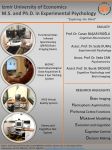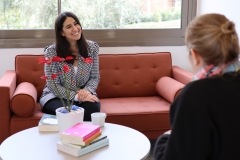
FACULTY OF ARTS AND SCIENCES
Department of Psychology
PSY 303 | Course Introduction and Application Information
| Course Name |
Psychology of Perception
|
|
Code
|
Semester
|
Theory
(hour/week) |
Application/Lab
(hour/week) |
Local Credits
|
ECTS
|
|
PSY 303
|
Fall
|
3
|
0
|
3
|
6
|
| Prerequisites |
None
|
|||||
| Course Language |
English
|
|||||
| Course Type |
Required
|
|||||
| Course Level |
First Cycle
|
|||||
| Mode of Delivery | - | |||||
| Teaching Methods and Techniques of the Course | DiscussionQ&ALecture / Presentation | |||||
| Course Coordinator | - | |||||
| Course Lecturer(s) | ||||||
| Assistant(s) | - | |||||
| Course Objectives | The aim of this course is to teach the relationship between the five sensory organs and the nervous system and the different sensory phenomena. |
| Learning Outcomes |
The students who succeeded in this course;
|
| Course Description | This course is a basic introduction to human sensory and perceptual systems. Because of the historical trend in this research area, the visual perception systems and principles will be focused on, but all sensory systems will be studied in detail. |
|
|
Core Courses |
X
|
| Major Area Courses | ||
| Supportive Courses | ||
| Media and Management Skills Courses | ||
| Transferable Skill Courses |
WEEKLY SUBJECTS AND RELATED PREPARATION STUDIES
| Week | Subjects | Related Preparation |
| 1 | Theoretical approaches to sensation and perception | Goldstein, E. (2016). Sensation and perception (10th ed.). Cengage Learning. Chapter 1 & 2 , pp.3-49 |
| 2 | Research methods in studying perception | Goldstein, E. (2016). Sensation and perception (10th ed.). Cengage Learning. Chapter 1 & 2, pp.3-49 |
| 3 | The visual system | Goldstein, E. (2016). Sensation and perception (10th ed.). Cengage Learning. Chapter 5, pp.125-149 |
| 4 | Color perception | Goldstein, E. (2016). Sensation and perception (10th ed.). Cengage Learning. Chapter 9, pp.195-227. |
| 5 | Visual pattern perception | Goldstein, E. (2016). Sensation and perception (10th ed.). Cengage Learning. Chapter 10, pp.227-259. |
| 6 | Visual attention and motion perception | Goldstein, E. (2016). Sensation and perception (10th ed.). Cengage Learning. Chapter 8, pp.171-195. |
| 7 | Midterm Exam-I | |
| 8 | Auditory perception | Goldstein, E. (2016). Sensation and perception (10th ed.). Cengage Learning. Chapter 11, pp.259-289. |
| 9 | Auditory perception | Goldstein, E. (2016). Sensation and perception (10th ed.). Cengage Learning. Chapter 12, pp.289-317. |
| 10 | Taste perception | Goldstein, E. (2016). Sensation and perception (10th ed.). Cengage Learning. Chapter 15, pp.361-384. |
| 11 | Scent perception | Goldstein, E. (2016). Sensation and perception (10th ed.). Cengage Learning Chapter 15. pp.361-384 |
| 12 | Tactual perception | Goldstein, E. (2016). Sensation and perception (10th ed.). Cengage Learning. Chapter 14. pp.337-361. |
| 13 | Midterm Exam-II | |
| 14 | Review of the semester | |
| 15 | - | |
| 16 | - |
| Course Notes/Textbooks | Goldstein, E. (2016). Sensation and perception (10th ed.). Belmont, CA: Wadsworth Cengage Learning, ISBN-13: 978-1305580299 ISBN-10: 130558029X |
| Suggested Readings/Materials |
EVALUATION SYSTEM
| Semester Activities | Number | Weigthing |
| Participation | ||
| Laboratory / Application | ||
| Field Work | ||
| Quizzes / Studio Critiques | ||
| Portfolio | ||
| Homework / Assignments | ||
| Presentation / Jury | ||
| Project | ||
| Seminar / Workshop | ||
| Oral Exams | ||
| Midterm |
2
|
60
|
| Final Exam |
1
|
40
|
| Total |
| Weighting of Semester Activities on the Final Grade |
2
|
60
|
| Weighting of End-of-Semester Activities on the Final Grade |
1
|
40
|
| Total |
ECTS / WORKLOAD TABLE
| Semester Activities | Number | Duration (Hours) | Workload |
|---|---|---|---|
| Theoretical Course Hours (Including exam week: 16 x total hours) |
16
|
3
|
48
|
| Laboratory / Application Hours (Including exam week: '.16.' x total hours) |
16
|
0
|
|
| Study Hours Out of Class |
14
|
3
|
42
|
| Field Work |
0
|
||
| Quizzes / Studio Critiques |
0
|
||
| Portfolio |
0
|
||
| Homework / Assignments |
0
|
||
| Presentation / Jury |
0
|
||
| Project |
0
|
||
| Seminar / Workshop |
0
|
||
| Oral Exam |
0
|
||
| Midterms |
2
|
25
|
50
|
| Final Exam |
1
|
40
|
40
|
| Total |
180
|
COURSE LEARNING OUTCOMES AND PROGRAM QUALIFICATIONS RELATIONSHIP
|
#
|
Program Competencies/Outcomes |
* Contribution Level
|
||||
|
1
|
2
|
3
|
4
|
5
|
||
| 1 | To have knowledge of basic concepts, theories, approaches (behavioral, biological, cognitive, evolutionary, social, developmental, statistical, humanistic, psychodynamic, and socio-cultural), and current applications specific to the field of psychology by using current course materials and instruments. |
X | ||||
| 2 | To have basic knowledge and skills about the applications in the different subfields of psychology. |
X | ||||
| 3 | To have basic knowledge about the testing and measurement instruments used in different subfields of psychology and basic level skill that does not require expertise in carrying out applications in different subfields of psychology. |
X | ||||
| 4 | To make use of other disciplines that may contribute to psychology and have basic knowledge about the contribution of psychology to these disciplines. |
X | ||||
| 5 | To have cumulative knowledge about the position of psychology as a scientific discipline in Turkey, the conducted research, applications and problems encountered from past to present in the field of psychology. |
|||||
| 6 | To have the competence to conduct a research individually and/or as a team using the knowledge acquired in the field of psychology, interpret the findings obtained by using scientific problem solving and critical thinking approaches. |
|||||
| 7 | To have the ability to construct a research hypothesis, create a research design, collect data, analyze it, report it in a scientific writing format, and interpret it by using basic knowledge related to testing and measurement, research methods, and statistics acquired in the field of psychology. |
|||||
| 8 | To have the competence to share the theoretical and applied knowledge acquired in the field of psychology with the experts and lay people by using the required information and communication technologies in scientific studies and events that benefit the society. |
|||||
| 9 | To have knowledge of the relevant professional and ethical values in the domains of psychology and respect individual differences and human rights in research and practices related to psychology. |
|||||
| 10 | To constantly renew herself/himself professionally by following both national and international publications in the field of psychology, the developments in testing and measurement instruments and software programs used in the discipline. |
|||||
| 11 | To establish written and verbal communication with experts and lay people by using both Turkish and English. |
|||||
| 12 | To be able to speak a second foreign at a medium level of fluency efficiently. |
|||||
| 13 | To be able to relate the knowledge accumulated throughout the human history to their field of expertise. |
|||||
*1 Lowest, 2 Low, 3 Average, 4 High, 5 Highest
NEWS |ALL NEWS

Emotional aftermath of an earthquake in children
Two earthquakes with a magnitude of 7.7 and 7.6, the epicenter of which were in Kahramanmaraş and caused destruction in 10 cities,

Özgener: We produce projects that meet the needs of Izmir
The official opening of the Psychology Research and Application Center (PUAM), which was established within the body of Izmir University of Economics

We rushed to the hairdressers to feel refreshed
Reopened beauty salons, hairdressers and barbers, as part of the "Normalization Process" which started to be implemented with the reduction in coronavirus

Coronavirus and sleep problems
The coronavirus pandemic, which has turned the world upside down and affected all aspects of our lives, including daily life, work habits

Online Therapy
The Coronavirus (Covid-19), which became a global threat and caused more than 200 thousand people to die so far, drove Turkish citizens,

Live in the moment
Psychologists often recommend to “focus on present” in order to cope with high levels of anxiety when we are all confined to

EXPERIMENTAL PSYCHOLOGY MASTERS DEGREE AND DOCTORATE PROGRAM APPLICATIONS
Submition deadline is 31 August 2018 For more information visit https://ss.ieu.edu.tr/en





